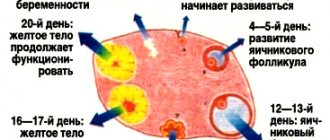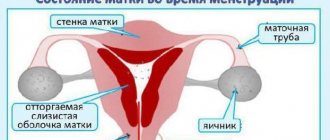Causes
There are different causes of chills before menstruation:
- increase in basal temperature;
- increased progesterone levels;
- premenstrual syndrome;
- ovulation.
All of the described conditions cause fluctuations in body temperature, which can ultimately lead to unpleasant symptoms.
Chills often cause an increase in basal temperature followed by a decrease. Indicators decrease before ovulation, menstruation, and after the ovulation window. You can correctly determine your basal temperature by adhering to the following rules. The optimal places for measurement are the mouth, vagina, and rectum.
Experts advise determining basal temperature rectally (in the rectum). The procedure should take three minutes, and the best time to measure is the period immediately after waking up from a long (6 hours or more) sleep. You can determine and predict changes in basal temperature by recording daily readings at a certain time in the morning. It is important to use one thermometer for this.
Progesterone is a hormone that affects the condition of the female body. Its amount depends on the day of the menstrual cycle. An increase in progesterone levels occurs before menstruation for 3-7 days. The concentration of the hormone decreases after the onset of menstruation. This hormone affects the process of thermoregulation. Progesterone, influencing the hypothalamus, where the thermoregulation centers are located, has a mild hyperthermia effect. The temperature fluctuation is 0.5-1 C.
The term PMS is understood as a combination of symptoms associated with the physiological and mental state of a woman. Among the metabolic and endocrine disorders of premenstrual syndrome, chills are often called. In addition, representatives of the fairer sex complain of muscle tremors, weakness, and changes in body temperature.
Another reason for chills is ovulation. The beginning of the ovulation window is characterized by an increase in basal temperature (37.2-37.5 C). By recording the thermometer readings during rectal measurement, the fairer sex will find out the day of ovulation and will be able to explain to herself the cause of the unpleasant sensation.
Why does it get cold before your period?
On the eve of menstruation, many representatives of the fairer sex notice that they begin to freeze. There are several explanations why a woman gets chills before her period.
Various factors can provoke an increase or decrease in body temperature, resulting in discomfort in the form of a feeling of cold.
Basically, the reasons why it’s cold on the eve of menstruation go away on their own in the first days of a new cycle and do not require treatment.
Physiological reasons
In the last days of the menstrual cycle, body temperature fluctuates, which is why it begins to freeze.
An increase or decrease in temperature depends on ovulation: before and after this process, the measurement results are lower, and during the time they are higher. As a result of such changes, before the onset of menstruation, a woman develops a feeling of chilliness and cold.
Another physiological condition that affects the feeling of chilliness during menstruation is an increase in the level of progesterone produced. This hormone affects thermoregulation processes in the body, increasing the temperature in the last days of the menstrual cycle.
These physiological factors cause temperature changes before menstruation, as a result of which the skin turns pale and trembling appears in the muscles. In some cases, with a strong impact on thermoregulation processes, a girl’s lips may turn blue.
The listed symptoms go away on their own with the onset of the next phase of the menstrual cycle, but provided that the body temperature does not rise above 37.6 degrees - this is a sign of pathology and requires contacting a doctor.
To know exactly what happens to a woman’s body at each phase of the menstrual cycle, we recommend reading additional information on this topic.
Atypical form of PMS
Chills are caused by an atypical form of premenstrual syndrome (PMS). There are 3 types of this phenomenon, but a girl can freeze only with one of them: hyperthermic. It is characterized by an increase in body temperature before menstruation to 38 degrees. With the onset of menstruation, this figure drops.
This phenomenon is associated with an increase in progesterone levels on the eve of critical days and its decrease when bleeding occurs. In this case, the woman shudders before her period due to an increase in temperature.
Inflammatory diseases
The appearance of chills during menstruation can be caused by inflammation in the genital area. In such conditions, body temperature rises significantly: it exceeds 37.6 degrees. Among the main reasons for the appearance of fever on the eve of menstruation are:
- Inflammation and endometritis in the uterine cavity - with an infectious lesion of the mucous membrane of the organ. The inflammatory process at the end of the cycle appears against the background of weakened immunity, which is why pathogenic microorganisms begin to multiply more actively. Symptoms of the pathology: constipation, pain in the lower abdomen and when urinating, the appearance of purulent or yellowish discharge from the vagina. During a gynecological examination, an enlarged uterus is noted.
- Adnexitis is an inflammatory process in the appendages. With this pathology, the temperature can rise to 40 degrees. In this case, nausea, vomiting, increased sweating, and weakness may occur. The woman also begins to feel cold. The pain that appears in the lower abdomen radiates to the legs.
If a girl has problems related to gynecology, chills before menstruation, she urgently needs to consult a doctor to diagnose the causes of pathological symptoms. If you do not undergo the necessary treatment in a timely manner, reproductive function may be impaired.
Anemia
Anemia can cause a condition where a woman's muscles tremble during her period. In the presence of such a pathology, weakness and chills occur systematically - regardless of the cycle. The situation can worsen on the eve of menstrual bleeding, when PMS appears. In this case, it not only freezes, but also shakes.
A reduced level of hemoglobin provokes rapid fatigue and weakness. Because of this, under the influence of an increase in the volume of progesterone, the body’s thermoregulation process is disrupted, and the woman becomes very cold.
Other factors
A woman gets chills not only for these reasons, but also under the influence of factors such as:
- emotional stress;
- hormonal disorders;
- increased blood pressure;
- the period preceding menopause.
If body temperature rises to non-critical levels and decreases with the onset of menstruation, chills are a physiological reaction of the body and do not require treatment. If a woman feels cold, severe temperature changes are observed, or symptoms of any pathology appear, it is necessary to consult a doctor.
Source: https://TopGinekolog.ru/menstruation/pms/pochemu-znobit-pered-mesyachnymi
Chills without fever
Chills, as noted, are a subjective physiological process. The reason for this is related to the need to maintain thermal balance. The appearance of trembling is not necessarily caused by a jump in body temperature. Causes of chills without fever:
- stress;
- emotional stress;
- hormonal disbalance;
- increased blood pressure;
- menopause
The female body is extremely susceptible to stress. Constant loads and tension can cause tremors before menstruation. Strong emotional stress, fear, and excitement change a woman’s condition. Doctors advise normalizing the status of the nervous system with sedatives. Tablets and herbal tinctures (valerian extract) have a calming effect.
Repeated occurrence of chills is sometimes caused by hormonal imbalance. The best solution is a consultation with an endocrinologist followed by a hormone test to possibly exclude thyroid diseases.
Chills with increased blood pressure are a sign of the development of hypertension. Ignoring the described condition can cause a hypertensive crisis or stroke. Women who feel chills when their blood pressure rises are advised to visit a doctor. The doctor will determine the diagnosis and prescribe appropriate medications.
Women experience climacteric syndrome in different ways. This is influenced by physiological and genetic factors. Many women entering menopause feel chills, they feel hot flashes and pressure surges. A gynecologist can advise the patient on medications that alleviate discomfort, of plant or synthetic origin.
However, we should not forget that chills can appear outside of menstruation against the background of hypothermia, poisoning, colds and more serious illnesses (malaria, Raynaud's disease).
If women stop shivering after their period, this is likely due to normalization of progesterone concentrations. Otherwise, the reasons are not related to gynecology.
Chills before menstruation during exacerbation of diseases
An often cited reason for chills before menstruation is exacerbation of diseases. The most common pathologies that cause chills are:
- adnexitis;
- endometritis;
- PMS.
Otherwise, adnexitis is called inflammation of the appendages. Its symptoms are: aching pain in the ovarian area, lower abdomen, urination becomes painful, patients feel chills, sometimes feel nauseous, and general weakness appears. The peculiarity of the condition is that the body temperature rises greatly two to three days before menstruation.
Endometritis is the process of inflammation of the uterus. This disease causes aching pain in the lower abdomen, painful periods, and heavy discharge. Purulent, sanguineous vaginal discharge is characteristic. The thermometer readings increase to 38C or more, the pulse quickens, and the level of leukocytes increases. There is a similarity with adnexitis. The presence of these symptoms is a good reason to see a doctor.
Premenstrual syndrome manifests itself differently. There are more than 150 of its symptoms. The most common changes in the body: fever (less than 38 C), chills, weakness, irritability, chest pain.
The difference between PMS and pregnancy is that when carrying a child, chest pain is constant, you want to eat salty foods, and taste preferences change. Mild, short-term pain in the abdominal area, frequent urination are possible, and toxicosis appears at 4-5 weeks. To verify the presence or absence of pregnancy, you should take a test or blood test for hCG.
The very first signs - can you feel them?
The modern world offers a large number of means of determining pregnancy in the earliest stages. Most often they are reliable in the first weeks after a missed period. Emotional by nature, women can feel the slightest changes in their body and even before the end of the menstrual cycle, suspect signs of the birth of a small life.
They are unlikely to name the exact date of conception, and the beginning of each cycle is marked on the calendar. Obstetricians will use this day as a basis for calculating the duration of pregnancy and the upcoming birth. Women planning motherhood are more likely to determine their due date if they tracked ovulation, which often occurs in the middle of the cycle.
The frequency of the cycle is different for everyone, most often it is a 4-week period, but it can be shorter or longer. As soon as the fertilization of the egg has occurred, metamorphosis occurs in the woman’s body. For some, they do not immediately become noticeable, while others feel the slightest nuances of physiological transformation already on the 16th - 18th day of the cycle.
Why do chills occur?
We are all accustomed to the fact that temperature changes occur during colds and viral diseases, and when there is inflammation in the body. Therefore, women usually do not measure their temperature before their period begins. However, during menstruation it is not always normal. Indicators can reach thirty-seven degrees, but this is not a sign of disease. Values above thirty-seven and a half degrees are considered abnormal.
If a woman shudders before her period, her skin turns pale, covered with goosebumps, and trembling is noted in the muscles. In severe cases, blue lips may appear. As a rule, girls do not pay attention to these manifestations and associate them with premenstrual syndrome or hormonal changes that occur in the body. But sometimes these symptoms can indicate the presence of a dangerous pathology.
- Causes of discomfort
There are several factors that may cause unpleasant chills:
- An increase in basal temperature and its subsequent decrease. Indicators change before and after ovulation, as well as before menstruation. Temperature measurements are taken in the rectum, mouth or vagina. The best method is rectal. The procedure is performed in bed immediately after waking up in the morning.
- An increase in the amount of progesterone, a hormone that affects thermoregulation processes. Its synthesis is directly related to specific days of the cycle. The level of progesterone increases a week before the onset of critical days, and after their onset decreases.
- Premenstrual syndrome is a complex of certain symptoms that manifest themselves depending on the psychological and physiological state of a woman. Among the most common manifestations are fever, muscle tremors, and changes in normal temperature.
- Ovulation - if a woman knows on what days it occurs, the deterioration in well-being can easily be explained.
These are the most common causes of chills that occur before menstruation. Normally, it goes away with the onset of bleeding.
- Discomfort without fever
If a girl is shivering, but her temperature remains normal, we are talking about a physiological reaction, which is associated with the need to maintain thermal balance. The problem may appear for the following reasons:
- Emotional turmoil, stress or fear. Increased mental stress can cause fever before menstruation. In such a situation, it is recommended to visit a neurologist and, if necessary, take sedatives.
- Hormonal imbalances can cause chills. To solve the problem, you need to consult an endocrinologist and get tested for the amount of thyroid hormones.
- Jumps in blood pressure are often accompanied by chills, and hands and feet are also cold. All these manifestations indicate developing hypertension. This condition cannot be ignored, otherwise a hypertensive crisis or stroke is possible.
- Menopausal syndrome - all women experience it differently, and physiological and genetic factors are of no small importance. Many girls experience fever, hot flashes and pressure fluctuations before the onset of menstruation. Specialized medications will help alleviate the condition, but only a gynecologist should prescribe them.
- Raynaud's syndrome is a chill that is accompanied by cramping of the hands. In this pathology, vascular spasms are observed, which are almost harmless. But not everyone is able to do their usual things in this state. To solve the problem, you can use a heating pad - it will help keep your hands warm. Another option is Botox injection.
- Malaria – if chills appear after traveling to southern countries, this is most likely a manifestation of malaria. Additionally, severe headaches, malaise, and sleep disturbances may occur. In such a situation, you need to immediately go to the doctor.
Chills are not always associated only with the menstrual cycle. It often occurs with severe hypothermia, a common cold, food poisoning and other ailments.
- Chills during exacerbation of diseases
One of the reasons for the unpleasant chills that occur before the onset of menstrual periods is the exacerbation of various diseases. The most common pathologies are listed in the table:
| Adnexit | Inflammation of the appendages, manifested by pain in the abdomen and ovaries, painful urination, nausea, chills and weakness. In addition, a couple of days before the expected menstruation, the temperature rises |
| Endometritis | Inflammation of the uterus. The main signs of the disease include abdominal pain, heavy discharge, and painful periods. The temperature reaches thirty-eight degrees, the pulse quickens, the number of leukocytes in the blood increases |
| PMS | Premenstrual syndrome, which affects everyone differently. Most often it causes chills, fever, chest pain, irritability |
https://youtu.be/FCnVR4pApeY
Why do I feel chills before my period?
Often the onset of menstruation is accompanied by a lot of discomfort. For many women, chills before their period are not uncommon.
It is accompanied by a sharp decrease and rise in temperature, the woman feels chilly. Pallor and dry skin may be observed.
A woman should clearly know why she is shivering and whether this condition is normal or indicates the development of the disease.
Causes of chills
Chills are quite common during menstruation, but women should be aware of what triggers them. There are several main reasons:
- Increase in basal temperature level. Many women do not control the level of basal temperature, so they do not connect its level and chills. Before the arrival of menstruation after ovulation, the temperature may drop, this is normal. To know her indicators, a woman should regularly measure her basal temperature in the rectum immediately after waking up. The procedure lasts 3 minutes and is carried out daily for about a month. This will allow you to see your performance and possible deviations.
- Another reason for chills is a change in the amount of progesterone in the blood. It is actively produced before menstruation, affecting thermoregulatory processes. An increase in progesterone levels leads to an average increase in temperature of 1 degree.
- PMS is a set of factors that influence the psycho-emotional and physical state of a woman during menstruation. Chills are one of the signs of premenstrual syndrome. In addition to this, menstrual tremors and general weakness appear.
- Ovulation may also be accompanied by chills. The basal temperature increases to an average level of 37 – 37.5 degrees. Regularly measuring your basal temperature and keeping a personal chart will make it easy to see your ovulation period.
The period of menstruation is not always accompanied by chills, but if such a condition is present, you need to clearly know what provokes its appearance.
Chills without fever
The appearance of chills in a person is not always associated with an increase in body temperature. the reason is that the body needs to maintain a level of thermal equilibrium. There are several main factors that provoke the development of this condition:
- prolonged exposure to stress;
- hormonal imbalance;
- strong emotional stress;
- menopause;
- increase in blood pressure level.
Experts say that if you feel chills during menstruation, the body indicates possible malfunctions. More often this is associated with strong feelings. To stabilize the condition, you can take sedatives.
The reason why a woman feels cold may be a hormonal imbalance. An endocrinologist can solve problems. The woman will undergo the necessary tests, he will see how the thyroid gland works. Severe chills often accompany the process of a sharp increase in blood pressure. Ignoring the condition can lead to serious consequences, including hypertensive crisis.
The premenstrual period may cause this condition. It depends on the individual characteristics of the woman’s body, how she tolerates menstruation. For some, they occur without discomfort.
This condition is not always due to the fact that monthly changes occur in a woman’s body. Chills may indicate hypothermia or intoxication.
If your condition does not improve after the start of your period, you should consult a doctor to determine the cause of the problem.
Possible diseases
Chills often occur not against the background of menstruation, but due to the development of pathological conditions in the body. It may indicate:
- adnexitis;
- endometritis;
- premenstrual syndrome.
The inflammatory process of the genital organs causes the development of adnexitis. The main symptoms of the pathology are severe pain localized in the lower abdomen. Pain may accompany the process of urination. The woman feels tired, lethargic, has a feeling of chills, and may occasionally feel sick. Before the onset of menstruation, with adnexitis there is also an increase in temperature.
Inflammatory processes in the uterus provoke the development of another gynecological disease - endometritis. It is characterized by heavy menstrual flow and pain in the abdomen.
In the absence of competent treatment, vaginal discharge in the form of clots and pus may be observed. The condition may also be accompanied by chills, a sharp increase in temperature, and increased heart rate.
In this case, you cannot hesitate; you need to urgently seek help.
Premenstrual syndrome, accompanied by chills and other discomfort, worsens a woman’s quality of life for several days and can make her unable to work. This condition can be corrected with medications. It is forbidden to self-medicate; you need to consult a doctor, first rule out the possibility of pregnancy, and then begin the necessary therapy.
How to help yourself
If chills are a normal reaction of the body to the onset of menstruation, and not a signal of the development of pathology, you can normalize the condition yourself. First aid includes simple, accessible recommendations, the implementation of which will have a beneficial effect on the condition of the body as a whole.
- You need to lead an active lifestyle. Constant movement will release endorphins into the blood. As a result, weakness will go away and your mood will improve.
- When chills appear, you can take a cool shower. Water will fill the body with new strength and lift your spirits.
- During menstruation, you need to fill your diet with healthy vegetables and fruits, giving up fatty, salty and spicy foods. Alcohol is prohibited.
- A full 8-hour sleep has a beneficial effect on a woman’s body.
- A woman should monitor her exercise during menstruation. This applies to the physical activity of visiting a sauna or bathhouse. Hot temperatures can have a negative impact on your well-being. During this period, you should avoid taking hot baths.
- It is worth eliminating coffee during menstruation, replacing it with weak tea. Exposure to caffeine during this period is unfavorable for the general condition of the woman.
- If possible, you should limit your medication intake. It is better to consult a gynecologist first and drink only herbal soothing teas during menstruation. If necessary, you can keep certain medications that should not be skipped.
Following the simplest recommendations will quickly allow you to see the desired effect. A woman will not suffer from unpleasant symptoms that worsen her quality of life, but will be able to even out and improve the general condition of the body.
The unpleasant sensations of feeling cold, shivering and “goosebumps running all over your body” are familiar to many women. You should clearly understand when this is a normal reaction of the body, and when it is a sign of a developing pathology. Self-monitoring and regular preventive examinations will eliminate the risk of developing diseases and allow you to enjoy life.
Source: https://TvoiMesyachnye.ru/obshhie-svedeniya/oznob-pered-menstruatsiej
Chills and pregnancy
One of the reasons for chills and temperature fluctuations before menstruation is pregnancy. This condition is explained by hormonal changes occurring in the female body. But this option is worth considering, only there is a delay in menstruation.
It often happens that a week after conception, a woman’s health worsens, her temperature rises and chills occur. These signs cause concern, but there is no reason for it - all these signs indicate that conception has occurred. The fertilized egg can only survive at thirty-seven degrees. Therefore, before ovulation, the hormone progesterone increases basal temperature. At the same time, its quantity increases. If pregnancy has occurred, its level does not decrease, which usually leads to the onset of menstruation, but, on the contrary, increases. As a result, chills are possible.
If you suspect pregnancy, it is not recommended to take medications or perform other medical procedures. If discomfort is a symptom of an interesting situation, it will soon go away on its own. Sometimes chills occur when the fetus freezes. This pathology is accompanied by a cessation of toxicosis, a decrease in mammary glands, and a decrease in basal temperature. The chill begins two to three weeks after the fetus dies due to intoxication of the body. Bloody discharge is often observed.
Chills can also occur when there is a threat of miscarriage. There are several reasons for this:
- The lack of vitamins is detected by a blood test and is compensated for with appropriate medications.
- Vegetative-vascular disorders do not pose a threat, but a doctor must constantly monitor them.
- High blood pressure is a dangerous condition for pregnant women and can cause chills.
- Constant excitement.
If chills appear and menstruation is delayed, you should contact a gynecologist who will help determine the causes of the problems and take appropriate measures to improve the woman’s well-being.
Test strips for determining ovulation
The easiest way to determine ovulation is to use special test strips that detect high levels of luteinizing hormone in a woman’s body and signal the onset of a fertile period. Most tests are presented with paper or plastic strips; more expensive options are equipped with a digital display.
Manufacturers advise not to urinate 4 hours before testing to ensure sufficient levels of the hormone are concentrated in the urine. Therefore, many women prefer to use strips in the morning.
If the result is positive (increased levels of luteinizing hormone), the test strip will take on the same color or slightly darker as the control. Typically, ovulation occurs 1-2 days after the level of luteinizing hormone begins to increase. This period of time is the most favorable for conceiving a child.
The start of testing depends on the cycle length:
Early signs of pregnancy appear at different times in women, as everyone's cycles are slightly different. For some it is 16 - 18 days, for others - 20 days. But the main signs of conception can be seen on days 21–22 of the cycle.
When to see a doctor
If the temperature on the eve of critical days changes slightly, this is quite normal.
But if the readings reach 37.4 degrees or more, perhaps we are talking about inflammation or serious pathology. Sometimes chills occur due to inflammation of the uterus. The disease can be identified by symptoms such as constipation, abdominal pain, purulent vaginal discharge. Only a doctor can confirm or refute the diagnosis.
Another cause of discomfort is adnexitis, which is characterized by a sharp increase in temperature to forty degrees, nausea and vomiting, weakness, and increased sweating. Urination becomes painful, it is impossible to touch the stomach, as severe pain is felt. If any alarming symptoms appear, you should go to a gynecologist. Changes in temperature during severe illness can cause significant harm to a woman’s reproductive system. In this case, competent and timely treatment is required.
First aid
If chills are a normal reaction of the body, you can improve your health by doing simple manipulations. To do this you need:
- Move a lot - don't lie in bed. With activity, the amount of endorphins in the blood increases, which relieve fatigue and lift your spirits.
- Take a cool shower - it adds strength and invigorates, improves the functioning of the whole body.
- Eat healthy foods - during menstruation you should not drink alcohol, eat fatty and spicy foods, or coffee.
- Rest at least eight hours a day - sleep restores strength and improves mood.
- Reduce stress - it is not advisable to overwork, take hot baths and go to the sauna.
Another way to improve your well-being is to take preventive medications. It could be Chinese Schisandra or Eleutherococcus. But be sure to talk to your doctor first.
Any unpleasant symptoms that appear during menstruation are an indicator of general health. Changes in the cycle can indicate many diseases, including non-gynecological ones. Monitor your condition carefully. If your period comes on time, your temperature does not rise above thirty-seven and a half degrees, there is no reason to worry. Otherwise, immediately go to the doctor - he will determine the cause of the problem and help eliminate it. You should not ignore chills or try to get rid of them on your own, since with serious illnesses there is a high risk of complications.









